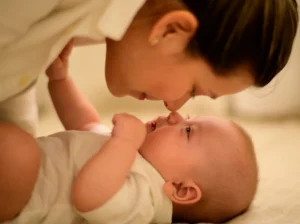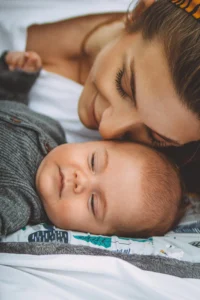There are three well-known ages that separation anxiety peaks. Knowing this will help you anticipate when it will occur and what it will look like. Being prepared will help you tackle any ways separation anxiety may affect sleep.
THE TREE MAIN PEAKS:
6-7 MONTHS
You may start to notice that when your baby is around 6 to 7 months old that they are processing your distance from them more than ever before. Up until now, you could probably leave the room for a few minutes and they would remain calm. Around this age, they begin to notice if you walk away and may start fussing or crying. Your baby is beginning to process object permanence and they are paying more attention to who is coming and going.
You might feel like this is a terrible time to start sleep training but it is actually a great time. Your little one is already going through a transition so may as well hit two birds with one stone.
9-10 MONTHS
Your little one will start to put the pieces together with certain routine activities. They will realize that going to certain locations means that they will be getting dropped off in a daycare or nursery or that certain rooms mean that it is naptime or bedtime. When they start to pick up on routine cues, they may also start to act more clingy and fuss in anticipation of separating.
If you have started sleep training before this age, remember to stay consistent! Bedtime routines may seem more difficult with the separation anxiety but remember that it is just a stage. Maintaining your bedtime routine that you have in place will help your little one get through their separation anxiety faster.
12-13 MONTHS
This peak of separation anxiety has a lot to do with language development. Your little one is starting to understand sayings like “it’s time for bed” or “it’s time to head to daycare.” At the same time, they don’t know how to communicate effectively yet so their attempts tend to come out as fussing or crying. They are frustrated that they can’t communicate which is absolutely normal and explains why they are particularly attached.
Try to find the fine line between comforting them and sticking to your normal routines and expectations. You will get through this and know that you aren’t doing anything wrong when your baby starts expressing separation anxiety, it is just part of development. If you are looking for help with your sleep questions, reach out to us.





